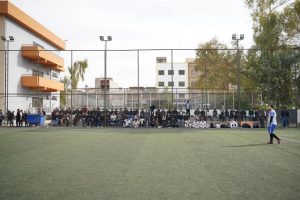
A Cihan University-Erbil Assistant Lecturer Published a Research Article with sciencedirect
Assistant Lecturer Mustafa Thanoon Younis from the Department of Medical Microbiology at Cihan University-Erbil published a research article entitled “Enhancing efficiency and reducing CO2 emission of a geothermal-driven polygeneration system: Environmental analysis and optimization ” in the Process Safety and Environmental Protection.
About the author:
Name: Mustafa Thanoon Younis
Qualification: MSc.
Academic rank: Assistant Lecturer
Affiliation: Department Medical Microbiology, Cihan University-Erbil
TAP: https://sites.google.com/cihanuniversity.edu.iq/mustafa-thanoon/home
Google Scholar Account: https://scholar.google.com/citations?user=82F3iKAAAAAJ&hl=en
ORCID account: https://orcid.org/0000-0002-6899-1037
Publons account: https://www.webofscience.com/wos/author/record/3637800
Journal Coverage:
https://www.sciencedirect.com/journal/process-safety-and-environmental-protection
Title:Process Safety and Environmental Protection
Science Citation Index: https://mjl.clarivate.com:/search-results?issn=0957-5820&hide_exact_match_fl=true&utm_source=mjl&utm_medium=share-by-link&utm_campaign=search-results-share-this-journal
Science Citation Index Expanded
Clarivate Analytics (Wos: IF = 7.8)
SCOPUS: Q1
Publisher: Elsevier GMBH
Country: United Kingdom
About the Paper:
Title: Enhancing efficiency and reducing CO2 emission of a geothermal-driven polygeneration system: Environmental analysis and optimization
DOI:https://doi.org/10.1016/j.psep.2023.03.055
Abstract:
The limitations of the single-flash cycle (SFC) include low efficiency, limited power output, and the inability to produce multiple products simultaneously. Additionally, the SFC requires a large amount of water and can have negative environmental impacts. In this study, to improve performance and produce multiple products, sub-systems such as a branched GAX cycle assisted by a thermoelectric generator, a domestic water heater, and a reverse osmosis unit are coupled with the SFC. Then, thermodynamic, environmental, sustainability, and net present value approaches are devoted to analyzing system performance. This study utilizes MATLAB software to achieve a two-objective optimization that uses both CO2 emission rate and exergetic efficiency as objectives. The CO2 emissions rate represents a downward inclination with an increase in temperature in the generator inlet. Net electricity, cooling load, and pure water rate have a downward inclination with an augmentation of the tem-perature in the generator inlet due to reducing mass flow rate in the branched GAX/TEG cycle. At the optimum point, the payback period of the designed system with increasing selling prices of the products is decreased. The polygeneration gain output ratio in the optimized conditions reduces compared to the base case, whereas the sustainability index increases. Compared to similar works, the designed system produces a higher output.



